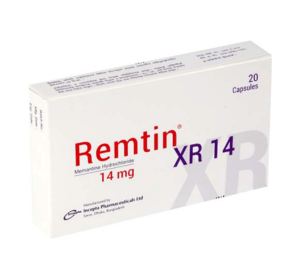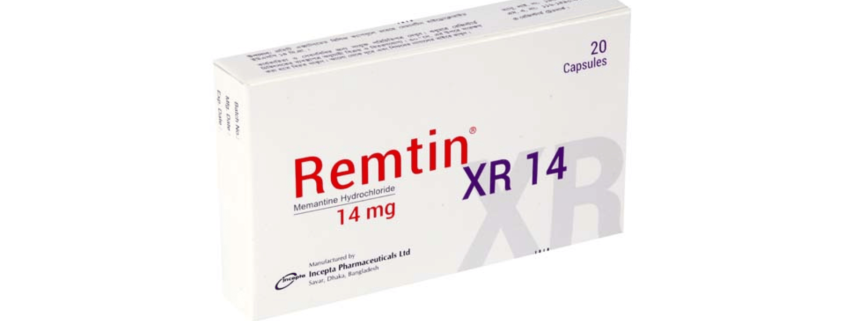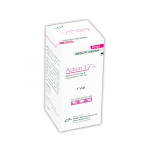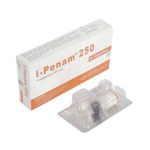Remtin(Memantine Hydrochloride)

Therapeutic Group: Drugs of Nervous System
Presentation
Remtin: Each film coated tablet contains Memantine Hydrochloride 5 mg.
Description
Memantine Hydrochloride is a low affinity, voltage dependent, uncompetitive NMDA (N-methyl-D-aspartate) receptor antagonist. Persistant activation of NMDA receptors in central nervous system by the excitatory amino acid glutamate contributes to the symptomatology of Alzheimar’s disease. Memantine exert its therapeutic effect through its action as a low to moderate affinity uncompetitive NMDA receptor antagonist and binds preferentially to the NMDA receptor-operated cation channels.
Indications
Remtin (Memantine Hydrochloride) is indicated for the treatment of moderate to severe dementia of the Alzheimar’s type.
Dosage & Administration
The recommended starting dose of Remtin is 5 mg once daily and the maintanence dose is 20 mg/day. In order to reduce the risk of side effects this dose is achieved gradually by the following treatment scheme:
a) 1st week:
– Morning dose:1 tablet ; Night dose: None
b) 2nd week:
– Morning dose:1 tablet ; Night dose: 1 tablet
c)3rd week:
– Morning dose:2 tablets ; Night dose: 1 tablet
d) 4th week and beyond:
– Morning dose:2 tablets ; Night dose: 2 tablets
Remtin can be taken with or without food.
In case of renal impairment: A target dose of 5 mg BID is recommended in patients with severe renal impairment (creatinine clearance: 5-29 ml/min).
In case of hepatic impairment: No dosage adjustment is needed in patients with mild or moderate hepatic impairment. Remtin should be administered with caution to patients with severe hepatic impairment.
Side Effects
The most common side effects (frequency 2% and less) are hallucinations, confusion, dizziness, headache and tiredness. Uncommon side effects are anxiety, hypertonia (increased muscle tone), vomiting, bladder infections and increased sexual drive.In case of epileptic seizure patients, Remtin may increase the chances of at least one occurring.
Precautions
Remtin has not been systematically evaluated in patients with seizure disorder. Conditions that raise urine pH may decrese the urinary elimination of Memantine resulting in increased plasma levels of Memantine. There is no evidence of carcinogenesis, mutagenesis and impairment of fertility.
Use in Pregnancy & Lactation
Pregnancy: Pregnancy Category B.
Nursing mothers:It is not known whether Memantine is excreted in human milk and therefore caution should be exercised when Memantine is administered to a nursing mother.
Drug Interaction
Use with other NMDA antagonists e.g. amantadine, ketamine & dextromethorphan has not been systematically evaluated. Drugs that are eliminated via renal mechanisms e.g. hydrochlorothiazide, triametrene, metformin, cimetidine, ranitidine, quinidine & nicotine are contraindicated. Drugs that make urine alkaline e.g. carbonic anhydrase inhibitors, sodium bicarbonate etc. are also contraindicated when given with memantine.
Over Dose
Signs and symptoms associated with memantine overdosage in clinical trials include agitation, confusion, ECG changes, loss of consciousness, psychosis, restlessness, slowed movement, somnolence, stupor, unsteady gait, visual hallucinations, vertigo, vomiting and weakness.
Storage
Do not store above 30 °C. Keep away from light and out of the reach of children.
Commercial Pack
Remtin®: Each box contains 3 blister strips of 10 tablets.



